Audi Q6 e-tron vs Mercedes EQE SUV - Differences and prices compared
Compare performance (490 HP vs 625 HP), boot space and price (54400 £ vs 71600 £ ) at a glance. Find out which car is the better choice for you – Audi Q6 e-tron or Mercedes EQE SUV?
Costs and Efficiency:
Looking at overall running costs, both models reveal some interesting differences in everyday economy.
Audi Q6 e-tron has a distinct advantage in terms of price – it starts at 54400 £ , while the Mercedes EQE SUV costs 71600 £ . That’s a price difference of around 17125 £.
In terms of energy consumption, the advantage goes to the Audi Q6 e-tron: with 15.60 kWh per 100 km, it’s to a small extent more efficient than the Mercedes EQE SUV with 18.30 kWh. That’s a difference of about 2.70 kWh.
As for electric range, the Audi Q6 e-tron performs minimal better – achieving up to 656 km, about 45 km more than the Mercedes EQE SUV.
Engine and Performance:
Under the bonnet, it becomes clear which model is tuned for sportiness and which one takes the lead when you hit the accelerator.
When it comes to engine power, the Mercedes EQE SUV has a evident edge – offering 625 HP compared to 490 HP. That’s roughly 135 HP more horsepower.
In acceleration from 0 to 100 km/h, the Mercedes EQE SUV is to a small extent quicker – completing the sprint in 3.70 s, while the Audi Q6 e-tron takes 4.40 s. That’s about 0.70 s faster.
In terms of top speed, the Mercedes EQE SUV performs slight better – reaching 240 km/h, while the Audi Q6 e-tron tops out at 230 km/h. The difference is around 10 km/h.
There’s also a difference in torque: Mercedes EQE SUV pulls barely noticeable stronger with 950 Nm compared to 855 Nm. That’s about 95 Nm difference.
Space and Everyday Use:
Whether family car or daily driver – which one offers more room, flexibility and comfort?
Both vehicles offer seating for 5 people.
In curb weight, Audi Q6 e-tron is to a small extent lighter – 2200 kg compared to 2440 kg. The difference is around 240 kg.
In terms of boot space, the Audi Q6 e-tron offers minimal more room – 526 L compared to 520 L. That’s a difference of about 6 L.
In maximum load capacity, the Mercedes EQE SUV performs hardly perceptible better – up to 1675 L, which is about 146 L more than the Audi Q6 e-tron.
When it comes to payload, Mercedes EQE SUV barely noticeable takes the win – 580 kg compared to 540 kg. That’s a difference of about 40 kg.
Who comes out on top?
Overall, the Mercedes EQE SUV shows itself to be slightly ahead and secures the title of DriveDuel Champion.
It convinces with the more balanced overall package and proves to be the more versatile choice for everyday use.
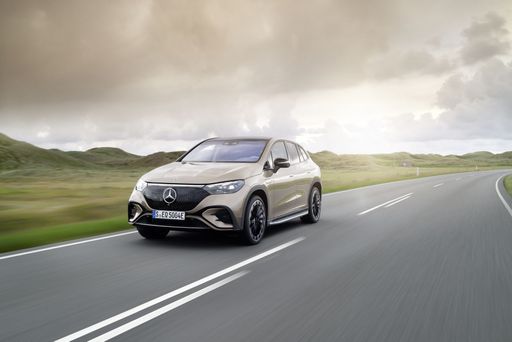
Mercedes EQE SUV
Costs and Consumption
View detailed analysis
Engine and Performance
View detailed analysis
Dimensions and Body
View detailed analysis
Audi Q6 e-tron
The Audi Q6 e-tron balances sleek, coupe-like styling with a roomy, upscale interior that feels modern without being showy. It delivers refined electric performance and smart tech that make daily driving effortless — the sort of EV that might make petrolheads grudgingly admit they fancy the future.
details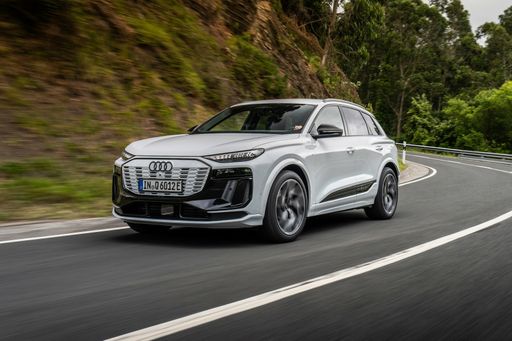
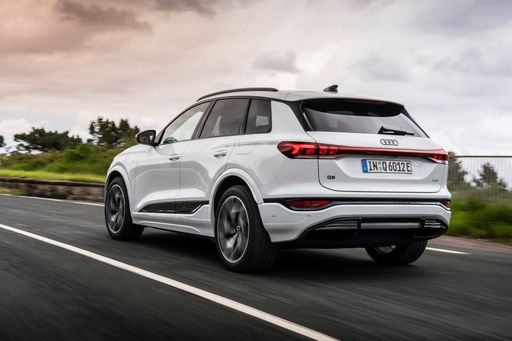
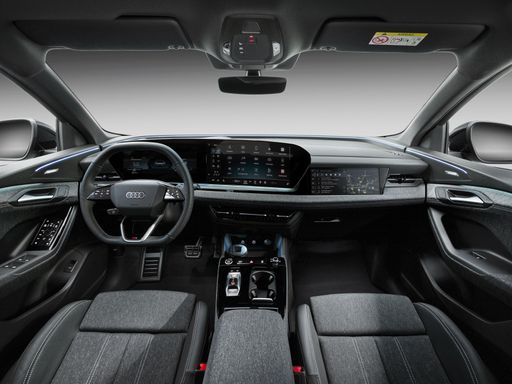
Mercedes EQE SUV
The Mercedes EQE SUV wraps silent electric power in a sumptuous, tech-filled shell, offering a cocoon-like cabin that makes long journeys feel indulgent. It’s not a driver's toy but a sophisticated cruiser for buyers who want luxury, space and futuristic gadgetry without shouting for attention.
details
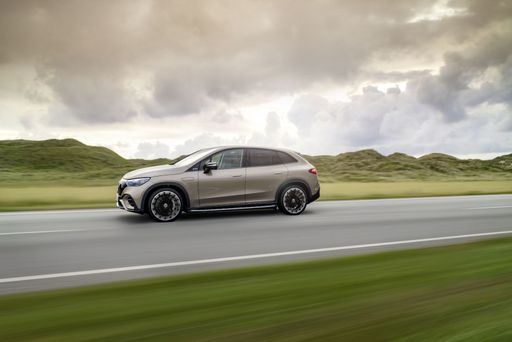

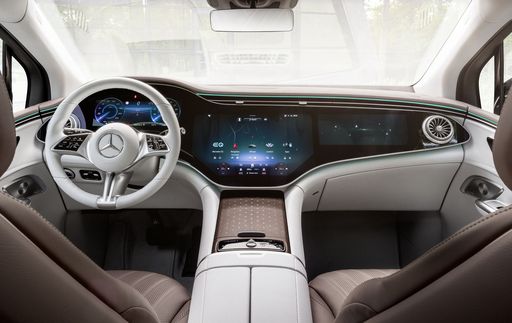
Costs and Consumption |
|
|---|---|
|
Price
54400 - 91900 £
|
Price
71600 - 125100 £
|
|
Consumption L/100km
-
|
Consumption L/100km
-
|
|
Consumption kWh/100km
15.6 - 18.9 kWh
|
Consumption kWh/100km
18.3 - 23.1 kWh
|
|
Electric Range
482 - 656 km
|
Electric Range
453 - 611 km
|
|
Battery Capacity
75.8 - 94.9 kWh
|
Battery Capacity
90.5 - 96 kWh
|
|
co2
0 g/km
|
co2
0 g/km
|
|
Fuel tank capacity
-
|
Fuel tank capacity
-
|
Dimensions and Body |
|
|---|---|
|
Body Type
SUV
|
Body Type
SUV
|
|
Seats
5
|
Seats
5
|
|
Doors
5
|
Doors
4
|
|
Curb weight
2200 - 2425 kg
|
Curb weight
2440 - 2615 kg
|
|
Trunk capacity
499 - 526 L
|
Trunk capacity
520 L
|
|
Length
4771 mm
|
Length
4863 - 4879 mm
|
|
Width
1939 - 1965 mm
|
Width
1940 mm
|
|
Height
1665 - 1685 mm
|
Height
1672 - 1685 mm
|
|
Max trunk capacity
1361 - 1529 L
|
Max trunk capacity
1675 L
|
|
Payload
540 kg
|
Payload
505 - 580 kg
|
Engine and Performance |
|
|---|---|
|
Engine Type
Electric
|
Engine Type
Electric
|
|
Transmission
Automatic
|
Transmission
Automatic
|
|
Transmission Detail
Reduction Gearbox
|
Transmission Detail
Reduction Gearbox
|
|
Drive Type
Rear-Wheel Drive, All-Wheel Drive
|
Drive Type
All-Wheel Drive, Rear-Wheel Drive
|
|
Power HP
252 - 490 HP
|
Power HP
265 - 625 HP
|
|
Acceleration 0-100km/h
4.4 - 7.6 s
|
Acceleration 0-100km/h
3.7 - 7.1 s
|
|
Max Speed
210 - 230 km/h
|
Max Speed
210 - 240 km/h
|
|
Torque
450 - 855 Nm
|
Torque
550 - 950 Nm
|
|
Number of Cylinders
-
|
Number of Cylinders
-
|
|
Power kW
185 - 360 kW
|
Power kW
195 - 460 kW
|
|
Engine capacity
-
|
Engine capacity
-
|
General |
|
|---|---|
|
Model Year
2024 - 2025
|
Model Year
2023 - 2025
|
|
CO2 Efficiency Class
A
|
CO2 Efficiency Class
A
|
|
Brand
Audi
|
Brand
Mercedes-Benz
|
What drivetrain options does the Audi Q6 e-tron have?
Available configurations include Rear-Wheel Drive or All-Wheel Drive.




